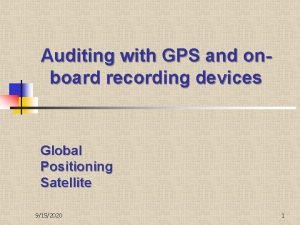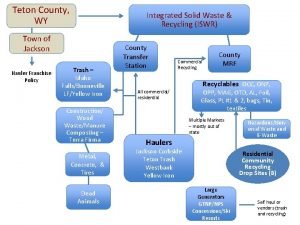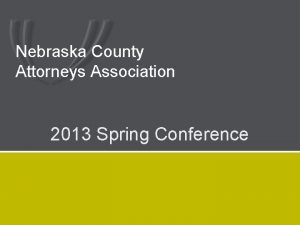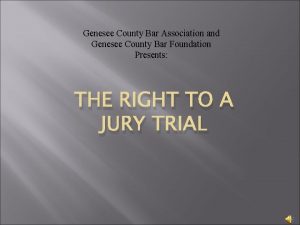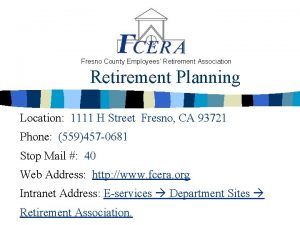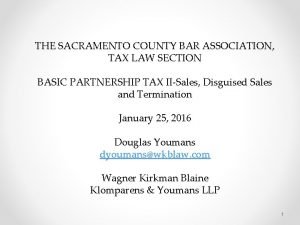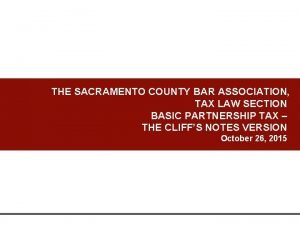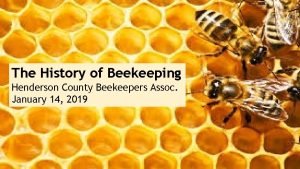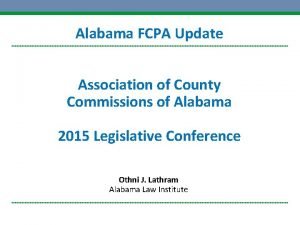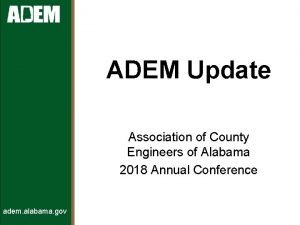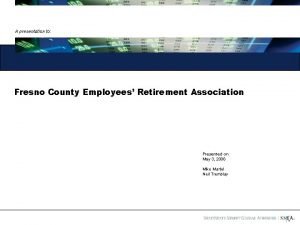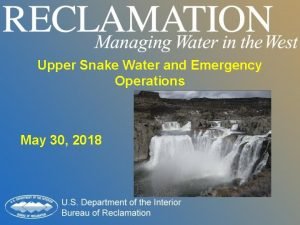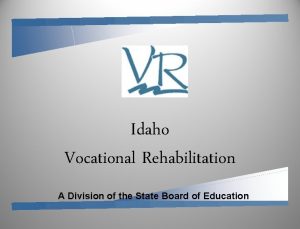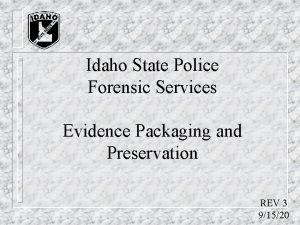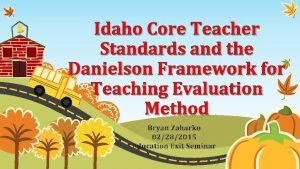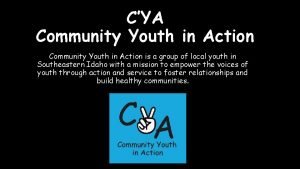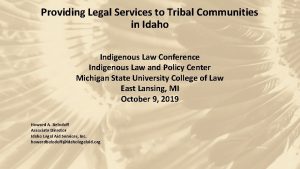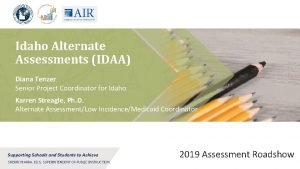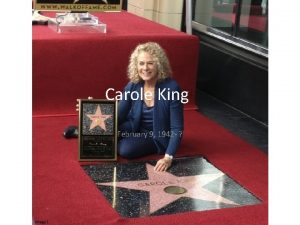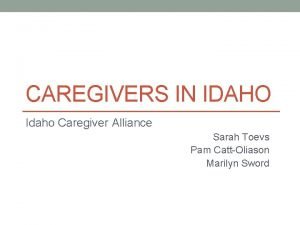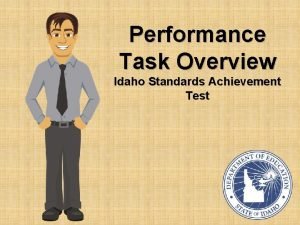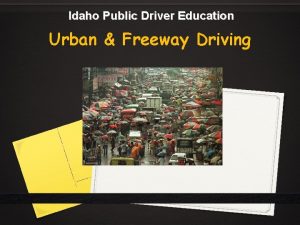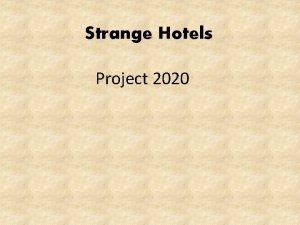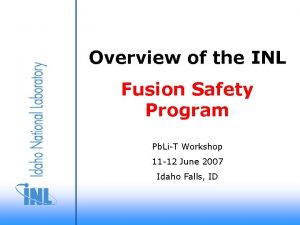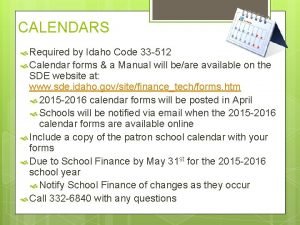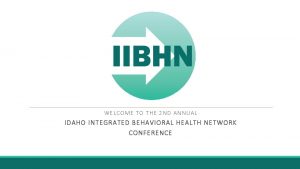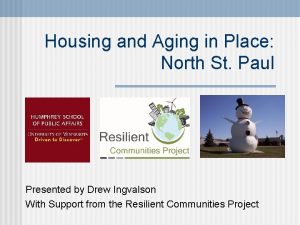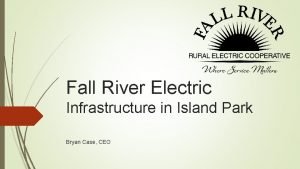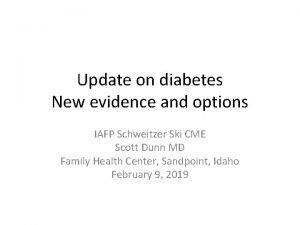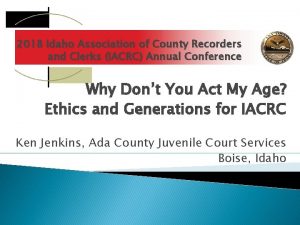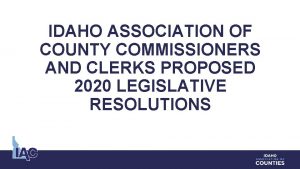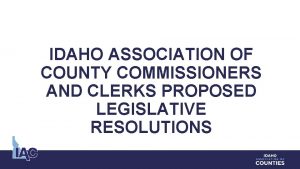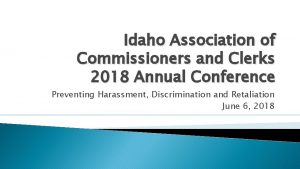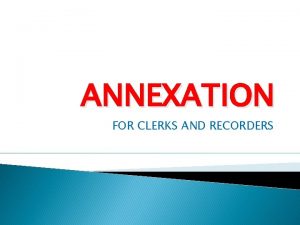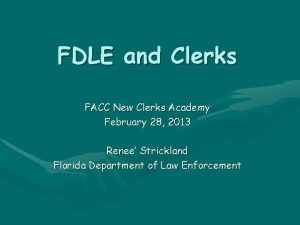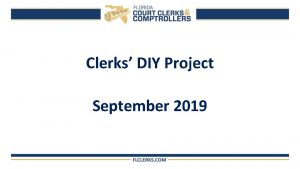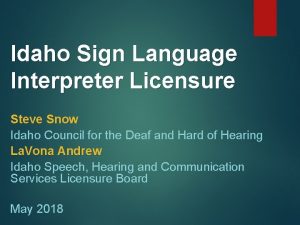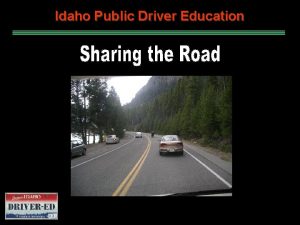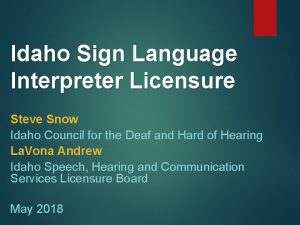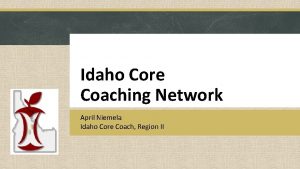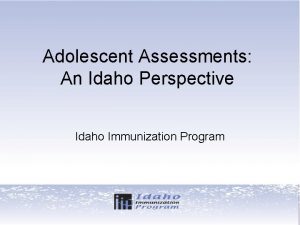2018 Idaho Association of County Recorders and Clerks



























































- Slides: 59

2018 Idaho Association of County Recorders and Clerks (IACRC) Annual Conference Why Don’t You Act My Age? Ethics and Generations for IACRC Ken Jenkins, Ada County Juvenile Court Services Boise, Idaho

Welcoming Individual Activity �Please take a marker and walk around to the seven Decade Charts on the walls �On each decade chart, please write ONE event (such as “Gulf War”), cultural memory (for example, “The Beatles”), or symbol (like “Sony Walkman”) that represents that particular decade to you �Then please have a seat and relax as you enjoy generational music! 2

For this class, the Generations: �G. I. : 94 to 108 years old �Silent: 76 to 93 years old �Baby Boomer: 54 to 75 years old �Generation X: 37 to 53 years old �Millennial: 24 to 36 years old �Generation Z: 23 years old and younger �There are other age ranges, but most are within a few years of these 3

Agenda �Introduction �Who Are We Talking About? ◦ The Generations, Generally �Communication Preferences �Ethics and Generational Challenges �Group Activity: The Right Thing to Do �Going Forward with Generations �Next Steps 4

Objectives � At the end of this block of instruction, the student will be able to: ◦ State the five generations in or served by our County employees ◦ List at least three collaboration techniques to help bridge generational gaps ◦ Share at least three ethical challenges for generations ◦ Describe at least one trait for each generation ◦ Demonstrate cross-generational communication skills in a group exercise 5

Bicentennial Class of 1976 Maize High School Maize, Kansas Your Instructor � Ken Jenkins – currently Training Manager for Ada County Juvenile Court Services (ACJCS) � ACJCS: 150 employees from four generations � Education: Montana State, Georgetown Law � 33 years in adult education (US Army, legal, law enforcement, and juvenile justice) � Passionate interest in workplace generational team building – I teach on it to various groups � Self-described Baby Boomer & pop music fan 6

Disclaimer and Explanations � There always exceptions to a generational characteristic � Some members do not conform to norms � Other factors affect characteristics, such as race, economic status, geographic location, language, and job experience – and this mix makes our teams uniquely talented � Do NOT assume members of a generation will always act as their generation “should” 7

What This Is (and Is Not) �This class is about: ◦ Generational distinctions ◦ Common generational traits and challenges for Idaho professionals ◦ Chance to relax and learn from others �It is NOT ◦ Communication or self-help course ◦ In-depth academic study of behaviors ◦ Simple guide on how to handle clients or coworkers 8

Who Are We Talking About? Generations - Generally � World War II or G. I. – born between 1910 & 1924 � Silent – 1925 to 1942 � Baby Boomer (Boomers) – 1943 to 1964 � Generation X (X’ers)– 1965 to 1981 � Generation Y (Millennials) – 1982 to 1994 � Generation Z – 1995 to ? ? ? ◦ These are the teenagers of today (2018 teenagers were born between 1999 & 2005) ◦ Where our ACJCS juvenile clients come from 9

G. I. Generation (ages 94 to 108) �This generation won WWII and saved us �Out of the work force now, but they positively impacted USA and next 2 generations (Silent, Boomer) �Known for: ◦ Loyalty to country and company ◦ Ambitious but appreciative men & women ◦ Wearing formal business attire ◦ Being well-educated (thanks to the GI Bill) �Somewhat hesitant about new things (rock’n’roll, social change, technology) 10

Silent Generation (ages 76 to 93) �Youth = Great Depression and the War �Role models: the G. I. Generation �Caught between GI’s and Boomers �Adult years featured fragmenting families, cultural diversity, economic success, and the unrest of the 60’s �Generally affluent and powerful leaders �Superb mentors for younger generations 11

Baby Boomers (ages 54 to 75) � Largest of all American generations (or is it? ) � Products of WWII victory and 25 -year $ growth � Boomer cultural touchstones still impact (rock & roll, TV, antiwar protests, sexual revolution) � Three sets of Boomers: ‘ 43 -’ 55 Boomers were subject to the draft during Vietnam, have less in common with others; ‘ 56 – ‘ 59 birth years are classic Boomers; latter Boomers (‘ 60 -’ 64) have more in common with Gen X � Workplace motto: work hard, pay your dues, & you will do well (but layoffs changed things) 12

Generation X (ages 37 to 53) � Saw end of the Cold War, Gulf War victory � Smaller generation: affected by increase in divorces, more moms in the workplace, & ZPG � Self-reliant and independent (latchkey kids) ◦ No real belief in workplace guarantees or promises, based on what they saw happen to Boomers � Less optimistic about the future and more cynical about the world � The Work-Life Balance Generation 13

Millennial (Gen Y) (ages 24 to 36) � Multi-taskers extraordinaire � Saw great horror (9/11, terrorism) and great triumph (expansion of the Internet) � Generally more optimistic than Gen X � Gen Y resembles the G. I. Generation (civic focus, out to save the world, open-minded attitude, and not intimidated by authority) � Very comfortable changing jobs/careers ◦ Like Gen X, do not enjoy “paying dues” or giving extra time to employers 14

Next? Gen “Z” (up through age 23) � First Americans to grow up in a Internetdominated world (and the Net is in your pocket) � Who are they? Kids born from 1995 through the present; generation to end around 2020 � Expect total communication (“digital natives”) � Known for Internet access 24/7, multiculturalism, globalism, & who knows what else � May 2016 Common Sense Media poll: a vast majority of parents say this generation is “addicted” to their smart phones 15

A Few Tips for Making Meetings Work for All Generations � Welcome everyone warmly, regardless of their apparent generation; be inclusive � Tailor your meetings and classes to all generations (including technology/AV use) ◦ Avoid using generation-specific topics without any background or explanation (On “Dragnet, ” Joe Friday would …) � Be quiet and listen (we need to hear the perspective of various generations) 16

Communication Preferences �Generations communicate differently (“The Bomb!” “Swell!” “Dude!”) �This can be a challenge in the workplace �Knowing communication preferences helps you use tailored/blended styles �Again, there always exceptions 17

Boomer Preferences �Person-to-person over electronic �Phone call over e-mail �Live meetings over online meetings �Written (memo, policy, letter) is fine 18

Gen X’er Preferences �Email over person-to-person �Cell phone calls OK if short �Meetings acceptable if quick and if facilitated by Gen X’er �Please, no paper if possible 19

Millennial Preferences �No meetings (in fact, limited interaction with people if possible) �Text or short email over phones �Smart phone communication best �Relaxed work environment – team projects good if flexible and fun 20

Generational Concerns: The Heart of the Matter �For any organization, generational transition brings about two emotions: fear and control �FEAR: Fear of new things �CONTROL: Who is in charge? �Address both, using education and communication in the workplace 21

Ethics and Generations �There are many ethical principles that cross generational lines and apply to ALL employees, regardless of age �Even as we look at the questions of ethics from the aspect of age, there are common ethical principles applying to everyone 22

The Bell, Book, and Candle Test � From the Josephson Institute � The Bell: Is there a problem? Be alert to bells warning you of an ethical issue. Outside employment, gifts, and gratuities and special discounts are among the “bells” that should induce you to check the “law”. � The Book: Is it Legal? Check organizational resources to confirm that your contemplated conduct is not governed or restricted by any laws, regulations or rules. � The Candle: Is it Right? Even if legal, how would your conduct look in the light? If a reasonable person could conclude you acted improperly, the act could damage you and your agency’s reputation. 23

Idaho Ethics in Government Act (2015) � Chapter 4 of Title 74, Idaho Statutes � Purpose is to: ◦ Protect integrity of government throughout Idaho ◦ Assure independence, impartiality, and honesty of public officials ◦ Inform citizens of personal interests that may present a conflict of interest ◦ Prevent a public office from being used for personal gain ◦ Prevent special interests from unduly influencing government ◦ Assuring government functions/policies reflect the public interest � Required Actions in Conflicts (74 -404) 24

74 -404 for County Officials � � (4) If he is an elected public official of a county or municipality, he shall disclose the nature of a potential conflict of interest prior to acting on a matter and shall be subject to the rules of the body of which he/she is a member and take all action required by the rules prior to acting on the matter. If a member requests to be excused from voting on an issue which involves a conflict or a potential conflict, and the body of which he is a member does not excuse him, such failure to excuse shall exempt that member from any civil or criminal liability related to that particular issue. The public official may obtain an advisory opinion from the attorney general or the attorney for the county or municipality or from independent counsel. The public official may then act on the advice of the attorney general or attorney for the county or municipality or his independent counsel. (5) If he is an appointed or employed public official of a county or municipality, he shall prepare a written statement describing the matter required to be acted upon and the nature of the potential conflict, and shall deliver the statement to his appointing authority. The appointing authority may obtain an advisory opinion from the attorney for the appointing authority, or, if none, the attorney general. The public official may then act on the advice of the attorney general or attorney for the appointing authority or independent counsel. 25

74 -406 – The Civil Penalty CIVIL PENALTY. (1) Any public official who intentionally fails to disclose a conflict of interest as provided for in section 74404, Idaho Code, shall be guilty of a civil offense, the penalty for which may be a fine not to exceed five hundred dollars ($500), provided that the provisions of this subsection shall not apply to any public official where the governmental entity on which said official serves has put into operation an ethics commission or board described in section 74 -404(6), Idaho Code. � (2) The penalty prescribed in subsection (1) of this section does not limit the power of either house of the legislature to discipline its own members, nor limit the power of governmental entities, including occupational or professional licensing bodies, to discipline their members or personnel. A violation of the provisions of this chapter shall not preclude prosecution and conviction for any criminal violation that may have been committed. � 26

So What Does This Mean for Us? � While ethical principles and state statutes apply to every generation, each generation may look at those principles/statutes from a unique perspective � Four recent studies in this area provide insight for us ◦ “Ethical Behavior Differs Among Generations” by Curtis Verschoor (Verschoor) – 2013/2017 ◦ “Generational Differences in Workplace Ethics” by the Ethics Resource Center (ERC) – 2013 ◦ “Ethics Across the Generations” by Guendalina Donde (Donde) – 2015 ◦ “Ethics and Generational Differences: Interplay Between Values and Ethical Business Decisions” by Elizabeth Guss and Mary Miller (Guss & Miller) -2008 27

Verschoor Study (including 2017 Follow-On Article) � Four groups reviewed (Traditionalists, Baby Boomers, Generation X, and Generation Y) equate to our Silents, Boomers, X’ers, and Millennials � Key findings: ◦ Millennials are more likely to experience pressure to break ethical rules than Boomers or X’ers (pressure eases as you stay in the organization) ◦ Silents are ethical leaders and have very high (over 90%) positive views of their company and their ethics ◦ Gen X’ers view of ethics best aligns with the organization’s policies and practices, but they worry about retaliation from senior management ◦ Over 80% of Boomers feel they don’t have influence on ethical matters in their company 28

Verschoor (Continued) � Millennials tend to use less organizational time for personal business than older generations (their work and personal lives are integrated) � Common workplace ethical misconduct reported by Millennials included: ◦ ◦ ◦ Doing personal business on organizational time Lying to fellow employees Abusive behavior (interpersonal issue) Abusing organizational resources Discrimination Misconduct (theft, falsifying expense reports, falsifying time sheets, services fail to meet standards) � However, Millennials saw these to be ethical: ◦ Using social networks to friend a client or learn about a competitor, uploading personal photos on organization network, working less to compensate for a loss of benefits or pay, and tweeting negatively about the organization 29

Ethics Resource Center (ERC) � If ethical misconduct was observed in the workplace, this is who each generation would tell: ◦ ◦ Silents: Family or friends Boomers: Family, friends, or government Gen X’ers: Family, friends, government, or legal counsel Millennials: Friends, family, government, social networking site, religious leader, or legal counsel � The feeling “the ends justify the means” is OK ◦ Silents: 12% - Boomers: 17% ◦ Gen X’ers: 22% - Millennials: 35% 30

ERC (continued) � For Boomers to report an ethical violation, they need: � For Gen X’ers to report an ethical violation, they need: ◦ Organizational resources for reporting, to feel prepared to handle an ethical dilemma, a feeling that the organization rewards ethical behavior, and encouragement to seek advice in uncertain situations ◦ Publicly available resources for support (legal aid, online support), encouragement to seek advice in uncertain situations, professional colleagues relied upon for support, and to not feel pressured � For Millennials to report an ethical violation, they need: ◦ Organizational resources for reporting, to feel prepared to handle an ethical dilemma, an organizational ethics advice resource, and supportive co-workers 31

Donde Article � Silents: very loyal to organization and have great respect for authority; low risk takers � Boomers: committed to their job and seek personal growth ◦ Both Silents and Boomers are less comfortable working with an ethics or legal advisor on an ethical dilemma, as they came of age before such interactions were common ◦ Less accepting of unethical behavior, more comfortable following guidance from senior leaders on ethics ◦ Respond well to formal ethics training and are more aware of organizational standards, systems, & processes 32

Donde Article (continued) � Gen X’ers: More independent , resilient, and adaptable to change than older generations (and a bit more cynical and distrusting) � Millennials: Empowered by parents and schools, with high expectations for their organizations to address social/environmental change ◦ Both are more likely to observe misconduct and less likely to report it (with less experience on how to deal with it) ◦ Both more likely to use ethics tools (online, ethics advisor, and other means) to gain more information � Bottom line: Tailor ethics communications in your organization to all generations (mix of methods) 33

Guss & Miller Research � Same breakdown of generations (Silent, Boomer, Gen X’er, and Millennial) � Focus on “work ethic” key part of research ◦ Older generations criticize Millennials and Gen X’ers for lack of work ethic (but more perception than reality) ◦ Silents view ethic as BIC (backside in chair) – at work ◦ Boomers combine BIC with collaboration/meetings ◦ Gen X and Millennials see it as working hard in an autonomous (and effective manner) and have a positive impact while maintaining a balanced life outside of work 34

Guss & Miller (continued) � The Issue of “Respect” and Ethics ◦ Silents and Boomers expect that respect because they have “put in their time” ◦ Gen X’ers and Millennials may feel disrespected because while they have not paid their dues, they make a strong contribution (and passage of time does not always equate to value to the organization) ◦ Also, Silents and Boomers focus on in-person discussions and paper/email documents in clear English ◦ Gen X’ers and Millennials are comfortable with electronic communication, “text speak” and a paperless world 35

Guss & Miller (continued) Conclusions � Position ethics as your top priority in your team � Treat everyone individually, not just by generation � Learn motivations and values of employees, and ensure your stated priorities match your ethics � Focus on your mission and the results/goals you seek, always within your ethical guidance – both ends and means need to pass the ethical test � Create parameters for ethical decision making and invite a wide variety of staff to provide input � Media climate can impact younger generations 36

Guss & Miller (continued) Final Conclusions � Embrace a diversity of opinion, be flexible in policies, and cultivate open minds to new ideas � Use a variety of communication styles for ethical messaging (in person, email, text, and websites) � Build relationships between people of different generations ◦ Pair Silents and Millennials on a project ◦ Send Boomers and Gen X’ers to offsite training together ◦ When in group meetings/trainings, mix the generations and have members of each lead parts of the event 37

Ethics and Generations – And Now? � There are distinctions between generations regarding ethics and the workplace � This topic demands more time, both from your instructor and in your offices � Keys to success include: ◦ ◦ Tailoring ethical messaging to generational groups Mixing generations in teams as much as possible Being open to new ideas and approaches Ensuring senior leaders set the example � To conclude, let’s do a short group activity 38

Group Exercise: The Right Thing to Do �In your groups, you will solve an issue or challenge with an employee in your team �Assume the work team in your scenario has a mix of the four generations, and is headed by a Boomer or X’er �Focus on ethical decision making, teambuilding and positive communication methods and techniques �Use your handout for reference as needed 39

The Right Thing to Do (continued) �You have a short summary about an issue or situation within your team �Please read the description and decide: ◦ ◦ Which generation do they come from? What are the generational issues in the scenario? What are the ethical issues raised in the scenario? What are the potential team building, communication, or training solutions that can address the issues? �Take 9 minutes – pick a spokesperson! 40

The Right Thing to Do – Groups �Spokespersons: After I read your description of your scenario, please share your answers: ◦ Generations of the employees? ◦ Summary of the generational issue(s)? ◦ Summary of the ethical issue(s)? ◦ Possible team building, communication, or training solutions for these issues? �One minute per table, please 41

The Software � Your colleague, Marge, is 59 years old and responsible for the budget in your office. Recently a newer employee, Raven (26) came to you to complain about expenditures. Raven stated that Marge will not authorize any new software purchases; she told Raven, “we have enough fancy computers right now. ” Raven needs a new application to handle data analysis, and she is very frustrated. She wants to call her brother-in-law, a local software sales rep, to see if he can give the County a lower quote to convince Marge to authorize the purchase. 42

The Winery Tour � Two County employees in your office are responsible for setting up a one-day training offsite for senior leaders. The employees, Carolina (25) and Duke (33), have contacted a local winery with a large conference room. The winery is supportive of the offsite and it is willing to waive the normal room fee of $100 as long as the group orders (and pays for) lunch from the winery. They also offer a free tour and tasting after work hours, so attendees are invited to participate. Their supervisor, Ralph (44) is supportive, but another team member, Alice (57) prefers to do the training in a County basement multi-purpose room. 43

The Dress Code � Your office supervisor, Jose, is 55 years old. Jose recently reminded your team of the organization’s dress code, including Katrina (29), Gerald (61), Sophia (44), and Brandon (24). Gerald and Sophia are OK with it. But the dress code specifically prohibits nose and other facial piercings, other than “one or two tasteful piercings in the earlobe area. ” Brandon has a nose piercing (but hides it while at work), and Katrina is scheduled to have one. Both have come to you to vent about the policy, and they have asked you to help. 44

The Lesson Plan � You are assigned to write a new lesson plan for professional development training with a colleague, Amy (40 years old). The course subject is proper behavior in the workplace. One area that your boss, Frank (57) wants to focus on is a stronger work ethic and completing tasks before going home. Amy disagrees with anything that upsets a work-life balance – “we need to do our jobs and then get home to our families”- and she does not want to include Frank’s task completion points in the proposed coursework. 45

The Campaign �A 2016 new hire in your Prosecutor office, Malik, is 30 years old. Malik is an Army military police (MP) officer who served two combat tours, then went to college. He serves as an investigator. Last November Malik’s mother-in-law, Lois (53), was elected County prosecutor. Malik was recently asked to serve as a liaison to local veteran’s groups as a secondary duty; he has declined to do so, stating that “I served my country and I do not want to dwell on those days – I lost friends over there. ” Several older employees (all veterans) are upset by Malik’s remarks. Lois has been silent on the matter. 46

The Smart Phone � Your newest hire, Kiara, is 21 years old. For the first three weeks she has been attentive and cooperative when asked a question, but when not in direct conversation, she is constantly on her phone checking Snapchat, Instagram, and her parent’s texts. Her colleagues Veronica (39) and Kathryn (48) have come to you to vigorously complain. “We sit right next to her, and she won’t even talk to us, ” vented Kathryn. Veronica adds that Kiara “has a hard time making eye contact with us. ” This week Veronica shared that Kiara received the phone at a vendor fair, where she was selected the winner in a raffle; the vendor has a contract with the County. 47

The Right Thing To Do : De-Brief �What did you think of the exercise? �This is hard – and important – stuff �Lessons Learned? ◦ Addressing generational issues in a healthy fashion is vitally important ◦ Communication preferences DO matter ◦ Ethics apply to all – everyone is bound by ethical principles, regardless of age 48

Generations and Collaboration �As a leader in your organization, you have a duty to serve clients and your teammates �You must know your own generation and its tendencies, yet work well with at least three other generations �Here are ten techniques I can confirm will aid you in this quest 49

Generations and Leaders (continued) � 1. Build your personal knowledge of other generations’ traits, preferences, and strengths (this training is a nice step forward) � 2. Focus on recruiting, hiring, & retaining Boomer, Gen X, Millennial, and Gen Z members (your strongest possible team) � 3. Increase your personal skill set regarding office technologies, both hardware and software (take the Tablet/Prezi test) � 4. Be humble and open to change 50

Generations and Leaders (continued) � 5. Read books and articles on generations and generational preferences, then apply those lessons in your own workplace � 6. Be prepared for – no, expect – no, WELCOME generational conflict in the workplace; it is how we learn and grow � 7. Ensure team members working with kids and families to apply cross-generational approaches in customer service 51

Generations and Leaders (continued) � 8. Keep up with new technology (as stated earlier, Gen Z and Millennial workers will quit because of older hardware/software) � 9. Remember the disclaimers: there always exceptions within each generation ◦ ◦ the the � 10. Gen Z’er who enjoys talking on the telephone Millennial who loves to hear “Cathy’s Clown” X’er who hates to text Boomer who writes code for a hobby Laugh often; all these generational adjustments can still make you chuckle 52

Even More Ways to Build a Strong Multi-Generational Team �Mentor and support members of all generations, not just someone “your age” �Encourage discussion of generational perspectives in meetings and classes �Find common ground, don’t build walls 53

Final Ways for Generations to Collaborate � Listen to stories ◦ Experiences at home and at workplaces provide excellent information � Be open minded ◦ Not everyone is the same: using an i. Pad is no better or worse than listening to The Drifters on a 33 1/3 RPM LP � Share control, lose the fear ◦ Build consensus as you develop policy, deliver training, and serve the public � Remember the Group Goal ◦ Focus on the team, not your own success (recall Saving Private Ryan) 54

Summary Comments on Generations � We are all unique, regardless of our generation � Whether or not you like to watch Fresh Prince of Bel Air, America’s Got Talent, or Bonanza doesn’t matter � What matters is our ability to ethically and effectively work with colleagues, peers, taxpayers, and partners, regardless of when they were born 55

A Quote to Ponder �“If you want happiness for a lifetime, help the next generation. ” Chinese Proverb 56

References � � “You Raised Us - Now Work With Us: Millennials, Career Success, and Building Strong Workplace Teams” by Lauren Rikleen Generational Dynamics: Collaborative Styles for Intergenerational Team Building by Dr. Annika Hylmo - readytomanage. com � “What Millennials Want From Work: How to Maximize Engagement in Today’s Workforce” by Jennifer Deal � � � How to Play Together in the Multi-Generational Sandbox at Work by Caroline Higgins - huffingtonpost. com “Sticking Points: How to Get Four Generations Working Together in the 12 Places They Come Apart” by Haydn Shaw Generational Differences in Workplace Ethics – A Supplemental Report of the 2011 National Business Ethics Survey – www. ethics. org 57

References (continued) � “Ethical Behavior Differs Among Generations” by Curtis C. Verschoor – www. accountingweb. com � “Ethics Attitudes Differ Among Generations” by Curtis C. Verschoor (2017) – Strategic Finance magazine, http: //sfmagazine. com/post-entry/february-2017 ethics-attitudes-differ-among-generations/ � Idaho Ethics in Government Manual, July 2015 by Lawrence Wasden, Attorney General � City of Boise Ethics Handbook – http: //mayor. cityofboise. org/media/460044/ethicshandbook-030314. pdf � “Ethics and Generational Differences: Interplay Between Values and Ethical Business Decisions” by Elizabeth Guss and Mary Miller – SHRM website (2008) 58

Conclusion �Thank you for your service, to your counties and to your fellow Idahoans! �I appreciated your attention–and your not texting (too much) during my class �Feedback is very welcome �Feel free to contact me if you have any additional questions ◦ Ken Jenkins ◦ 208 -577 -4854 kjenkins@adaweb. net or ◦ 208 -401 -8367 ekenj 3@gmail. com 59
 Electronic onboard recorders
Electronic onboard recorders Idaho irrigation equipment association
Idaho irrigation equipment association Teton county trash transfer station
Teton county trash transfer station B a f c j e
B a f c j e Idaho academy of nutrition and dietetics
Idaho academy of nutrition and dietetics Apids
Apids Nebraska county attorney association
Nebraska county attorney association Genesee county bar association
Genesee county bar association Fresno county employees retirement association
Fresno county employees retirement association Sacramento county bar association
Sacramento county bar association Sacramento county bar association
Sacramento county bar association Henderson county beekeepers
Henderson county beekeepers New york state county highway superintendents association
New york state county highway superintendents association Fcpa alabama
Fcpa alabama Alabama association of county engineers
Alabama association of county engineers Fresno county employees retirement association
Fresno county employees retirement association Idaho teacup diagram
Idaho teacup diagram Nrf idaho
Nrf idaho Idaho falls bishops storehouse
Idaho falls bishops storehouse Idaho travel council
Idaho travel council Shiba idaho
Shiba idaho Vocational rehabilitation idaho
Vocational rehabilitation idaho Isp prelog
Isp prelog Idaho state communications
Idaho state communications Idaho core teacher standards
Idaho core teacher standards Idaho core teaching standards
Idaho core teaching standards Idaho dbe directory
Idaho dbe directory Cya idaho falls
Cya idaho falls Idaho heart institute
Idaho heart institute Idaho refugee conference
Idaho refugee conference Legal aid idaho
Legal aid idaho Idaho sound beginnings
Idaho sound beginnings Idaho quest card
Idaho quest card Isat portal
Isat portal Iasbo idaho
Iasbo idaho Iasbo idaho
Iasbo idaho Rick sorenson idaho
Rick sorenson idaho Idaho caregiver alliance
Idaho caregiver alliance Marijuanas legalized idaho
Marijuanas legalized idaho Ref et idaho
Ref et idaho Performance task ideas
Performance task ideas Idaho driver's manual
Idaho driver's manual Dr derek bub
Dr derek bub The dog bark park inn idaho usa
The dog bark park inn idaho usa Idaho roadless area
Idaho roadless area Idaho national laboratory
Idaho national laboratory Idaho code 33-512
Idaho code 33-512 Tide portal idaho
Tide portal idaho Mtm idaho
Mtm idaho Idaho cleanup project
Idaho cleanup project Aging in place remodeling idaho
Aging in place remodeling idaho Fall river electric west yellowstone
Fall river electric west yellowstone Idaho commission on aging
Idaho commission on aging Idaho commission on aging
Idaho commission on aging Dr scott dunn sandpoint idaho
Dr scott dunn sandpoint idaho 7 wonders of california
7 wonders of california Eat smart idaho
Eat smart idaho Idaho ebt balance
Idaho ebt balance Idaho rangeland resource commission
Idaho rangeland resource commission Idaho ag biz
Idaho ag biz
